- Home
- Neil Plakcy
Three More Dogs in a Row Page 2
Three More Dogs in a Row Read online
Page 2
My mother had passed away soon after Mary and I moved to California, so by the time I was released from the California Men’s Colony in San Luis Obispo, I was an orphan, with no wife, no job, and no family other than a bunch of cousins. I petitioned the parole board in California for permission to return to Stewart’s Crossing, and once it was granted I was assigned Santiago Santos as my parole officer. He was an amateur boxer with a sociology degree, and through a series of unannounced home visits he kept track of everything I was doing to rebuild my life.
My parole was due to end in September, and I had been looking forward to regaining my freedom. But Santos was determined to ensure I wouldn’t be tempted to do anything that might send me back to prison. He worried that if I didn’t have a solid income I’d be tempted to return to hacking – this time for profit. Suppose he saw this job loss as a setback he needed to monitor further? And if he did, would he be able to convince a judge to extend my parole?
I had some advantages I hadn’t had when I first returned to town. I had reconnected with an old high school acquaintance who became my best friend. I met my neighbors and got to know a lot of employees at Eastern. And I met Liliana Weinstock. At forty-five, it was silly to think of Lili as my girlfriend, but the English language hasn’t caught up to twenty-first century mating practices yet.
But how long would that network hang together if I was unemployed and running low on money? Clouds gathered overhead as we drove up to Leighville along the River Road, and by the time we reached the college the sky was gray and gloomy. I had to park at the outer edge of the parking lot and then hustle Rochester out of the car before it began to pour.
He was still moving slowly as I shepherded him past the deep pools of water at the edge of the parking lot and the marshy patches of lawn between there and Fields Hall, the 19th-century gothic mansion that had been converted to college offices. We passed a young female student reading on one of the wrought-iron benches, seemingly oblivious to the coming storm. Her T-shirt read “Girls Just Want to Have Funds.”
Boys, too, I thought. My first-floor office was small, tucked away in a corner of the building that had once been part of the formal dining room, but it had French doors looking out at the garden, and I left Rochester there with a chew bone and a plea not to get sick on anything. I was worried that Dr. Horz hadn’t been able to diagnose him more specifically and I hated having to leave him alone, even for what I was sure would be a very quick exit interview with President Babson. At least when I finished with that I could clean out my office and then take Rochester home.
Fields Hall was a warren of small offices carved out of larger rooms, and I had to navigate past a copier in the middle of the narrow hallway to get to the small alcove where Babson’s secretary sat.
She waved me into his office, where the great man was finishing a phone call. He was tall and rawboned, an urbane, well-dressed John Wayne. But instead of being taciturn he bubbled over with enthusiasm, no matter what the subject or his knowledge of it. He had deep green eyes and dark curly hair that he styled with the kind of greasy kid stuff I had abandoned when I reached puberty.
“Steve, come on in,” he said, waving me to a spindle-backed chair embellished with the Eastern College logo, across from his desk.
I sat down and he said, “You grew up in this area. Ever heard of Friar Lake?”
That threw me for a loop. I was expecting some kind of termination speech, to end with me and Rochester being escorted out of the building by security guards. Sure, Eastern had a human resources department, but Babson was such a micro-manager I was sure he liked to handle hiring and firing himself.
My brain was a jumble. “It sounds familiar, but I can’t quite place it.”
“About a hundred years ago, the Benedictine Order built a monastery on about twenty acres of land a mile inland from the Delaware River. The building overlooks a lake, and down by the water’s edge they built a cabin for the use of mendicant friars. Eventually the local people started calling the area Friar Lake.”
“Mendicant friars?” Those weren’t covered in my dozen years in Sunday School at Har Sinai Temple in Trenton, or in the three years of weekday afternoons I spent studying Hebrew in preparation for my bar mitzvah.
“Both monks and friars are men devoted to religious service,” Babson said. “The difference is that monks live in cloisters, while friars perform service to the sick and needy out in the community. When friars get old and sick themselves, they need a place to go. The Benedictines hosted them in a cottage down by the lake.”
I still wasn’t sure where this was all going. I wasn’t a friar; I wasn’t even Christian. Was he trying to say that these monks and friars ran some kind of halfway house? I appreciated the thought, but even though I was a convicted felon on parole, I could still manage for myself.
Babson was still talking. “The monastery closed about two years ago, and the remaining monks and friars moved to another one in western Pennsylvania. I guess even the church has to cut costs where it can.”
My impatience got the best of me. I was worried about Rochester back in my office, and about my own need to get started on a search for a new job. “This is interesting, but…”
“Of course. I’ll cut to the chase. Eastern is buying the property from the Benedictine Order, and I want to develop it as a conference center where our faculty can teach executive education courses.”
“And?” I was still confused, and getting irritated.
“And I want you to run it. Didn’t Mike tell you?”
So I wasn’t out of a job, just getting transferred? That was amazing. My head was filled with a jumble of relief and confusion. “All Mike told me was that the News Bureau was taking over the responsibility for press relations for the campaign, and I was out of a job.”
Babson frowned. “I’m sorry, Steve. I thought he would have mentioned it, but I guess he didn’t want to steal my thunder. I just signed the paperwork transfer on Friday, and I talked to Mike on Saturday about giving you the job. He said he was sorry to lose you but he was certain you’d do a bang-up job.”
I was glad Mike and Babson were so certain. I knew nothing about executive education or running a conference center. But I would do whatever I had to in order to keep body and soul together – mine and Rochester’s.
Babson pushed a report encased in a plastic folder across the desk to me. “This is the feasibility study I commissioned. Start thinking about the kinds of programs we could offer up at Friar Lake. Talk to the faculty, see what ideas they have. We need to put on programs that adults and corporate learners can use—and that they’ll pay for.”
Put together a whole continuing education program while setting up a brand-new conference facility. That was John Babson for you. It was a lot to process at once.
“When you’ve had a chance to get your feet wet, set up a meeting and we’ll go over your ideas. Oh, and you’ll want to talk to Elaine in HR about your new status. You might as well stay in your office for the time being, at least until Physical Plant starts the renovation work at the abbey. You’ll want to be out there by then.”
I picked up the report. “Why me?” I asked. “I don’t know anything about construction or running a conference center, or developing programs.”
He leaned forward. “What is it that we brag our students really learn here at Eastern?” he asked.
The twists in this conversation were as confusing as some of the back roads leading from the Delaware into the countryside, but I struggled to keep up. “We teach our students how to learn,” I said, and I felt like I was reciting something from a brochure I might have written. “How to read and assimilate information, how to communicate what they’ve learned, and how to use those skills to survive and prosper in the work world.”
“Absolutely. I chose you for this position because you know Eastern College and what we stand for – not only as a graduate but as a member of our adjunct faculty. And between the campaign launch and your help with Joe Dagori
an’s murder, I’ve seen how well you can multi-task.”
I thought Babson would be finished, but he was in a reflective mood. For the next ten minutes or so, he lectured me on Eastern’s history and his plans for its future. I couldn’t pay much attention because my brain was so muddled.
I dimly understood that I was being given a great opportunity. This was a permanent position—which in academia often means for the rest of your working life. That was a big relief—I’d gone from unemployed to long-term employed in the span of a few minutes. But it was frightening at the same time. In addition to my lack of background, this was a huge project with high visibility. Why hadn’t I heard about it before?
I realized that I had – there had been a line item at the last Board of Trustees meeting about the property. But I’d been so busy with my own job I’d paid it little notice.
“I’m proud of you, Steve,” Babson said, and I snapped back to attention. “You’ve made some bad decisions in the past, but you’ve paid the price, and you’ve managed to bounce back. I have every confidence in you.”
I realized that what Babson was telling me was that he knew I’d been in prison—and despite that, he believed in me. I gulped, stood up and shook his hand. “Thank you for the opportunity, and for believing in me.” I held up the report in its plastic folder. “I’m looking forward to reading this and getting up to speed.”
As I turned to walk out, he already had the phone in his hand, ready to move on. I needed to do that, too-- but I was in a daze. It wasn’t a surprise that John Babson knew I’d been in prison; he knew almost everything that went on at Eastern, from the leaky faucet in the women’s room at Blair Hall to the birthdays of each of the members of the Board of Trustees. He could switch easily from a conversation about college investments to one about a student’s lack of progress in a math class.
But he had never mentioned it, and I was embarrassed that he had felt the need to bring it up in our meeting. It did make his faith in me that much more dramatic. I wasn’t just an alumnus with a skill set that happened to fit in at the college. I was a project, like the female sophomore who wanted to spend the summer in Tanzania teaching personal hygiene to young girls. Babson had championed her cause, introducing her to wealthy sponsors and even helping her fine-tune her project proposal.
There were dozens more like her—students who wanted to create individualized majors, faculty members with innovative teaching techniques that needed funding, athletes who wanted to compete internationally. If Babson believed in you, he put himself behind you and pushed.
He had also been known to take strong action when disappointed. Students transferred, staff members terminated, faculty members encouraged to pursue their careers elsewhere. It was up to me to take the pressure and prove to him – and myself—that I could succeed.
3 – Trust
Rochester didn’t get up when I opened the door to my office, and I hurried to see if he was all right. His nose was warm, but he sat up, and when I hooked his leash he got to all fours and followed me outside.
The rain had ended and the clouds overhead were moving away as I led him around the gray-black stone bulk of Fields Hall to the Cafette, an on-campus sandwich shop in an old carriage house. It was a worn, homey-looking place, decorated with Eastern pennants and faded T-shirts, with old wooden picnic tables and benches. Rochester stopped beside a trash can and lifted his leg to pee, his nostrils quivering as he did so.
I looped his leash around the leg of an Adirondack chair painted in Eastern’s colors of light blue and white and went inside. The kitchen took up most of the back of the room, while the front was cluttered with small tables and uncomfortable metal chairs. Off to the left was an inglenook, almost a separate room, with a fireplace in the center and overstuffed chairs around it. In the colder months the staff kept a fire going, and it was a favorite place for students to curl up and study. In the summer, the multi-paned windows at the far end were kept cranked open and a warm breeze floated through.
I ordered a strawberry-banana smoothie and a pair of chocolate croissants, then went back out to Rochester. A cluster of undergrads filled one of the nearby picnic tables, each of them busily texting on their phones. A couple of other chairs were occupied by individual students, some reading textbooks, others intent on their iPads or laptops. A white butterfly swooped around the oak branches above my head.
I settled down in the oversized chair and began to read. Babson’s plan included courses that might last anywhere from three hours to three weeks, taught by our regular faculty. A professor of accounting might offer an update on tax law, while a professor of folklore could host a residential program during the summer on Pennsylvania Dutch handicrafts.
“I guess you college types don’t work much during the summer, huh?”
I looked up to see Rick Stemper standing beside my chair. The only indication that he was a detective was the Stewart’s Crossing Police Department logo on the breast of his white polo shirt—and the fact that his shirttail was out, covering the holstered gun attached to his belt.
“I’m working,” I said, holding up the report. “What are you doing up here?”
Rochester jumped up to greet him, and Rick ruffled the big dog’s furry neck. He had a tall clear plastic glass of lemonade in his hand, and he pulled another Adirondack chair over to face mine. He reached over and took one of the croissants.
“You’re a bad man,” Rick said. “You know I’m trying to watch my waistline.”
“And you’ve got it right out there where you can see it,” I said.
“Asshole.” At least he said it with a smile. And I was kidding him, of course. Rick was almost as lean as he’d been when we were at Pennsbury High together. We hadn’t been friends then—just acquaintances and occasional classmates. But after I returned to Stewart’s Crossing we bonded over our divorces, and the bond between us had been solidified when he adopted Rascal from the local shelter. The Australian shepherd had become Rochester’s best friend.
“How’s the Rascal?” I asked, picking up the other croissant before Rick could grab it.
“Wild as ever. Yesterday he tried to herd Mrs. Kim’s schnauzers.”
Mrs. Kim was Rick’s elderly Korean neighbor; she was a sucker for rescued schnauzers and usually had at least three or four in the house.
“How’d that work out?”
“One of them nipped him on the nose, and he came whimpering back to me.”
“So what brings you up here? Digging up hidden secrets of faculty members?”
“Nah. Looking into a series of robberies in Stewart’s Crossing, and turns out there have been similar ones up here. Tony Rinaldi and I met this morning to compare notes. Thought I’d get something cold before heading back downriver.”
I had met Tony, Rick’s counterpart in Leighville, a year before, when the investigation of Caroline’s murder led to Eastern College. “But the towns don’t share a border, do they?”
Rick shook his head. “No, Washington’s Crossing is in between, along with a big chunk of unincorporated Bucks County. But in each case, the robbers are targeting single-family houses on oversized lots.”
“Like Crossing Estates?” When Rick and I were kids, the hills above Stewart’s Crossing had been lined with endless fields of corn and U-pick strawberry farms. But in the early eighties, a couple of larger farms had been developed into a sprawling landscape of mini-mansions.
“Exactly,” Rick said. “Every house either has no burglar alarm, or had it shut off at the time of the break-in. No dogs to make noise either.” He pointed at Rochester, who looked up at him in hopes of a piece of croissant. “Homeowners drive luxury cars. Each house has sliding glass doors with cheap locks and no pry-bar keeping them in place.”
“Doesn’t breaking the glass make noise?”
He shook his head. “These crooks don’t break the glass, they pick the sliding door lock. Then they have access to the whole house.”
“Any leads?”
&
nbsp; “Not a one. They don’t disturb much in the house, for a day or two the homeowner doesn’t even realize he’s been burgled. The thieves are careful not to leave fingerprints, and they’ve only been taking small high-value items like watches, jewelry and collectibles.”
Rochester lifted his head up as if he’d been listening. The sunlight glinted off his fine, wiry whiskers, which sprouted from his eyebrows as well as his muzzle. “Nothing showing up in pawn shops?” I asked.
Rick held up a hand to me. “I know, your Hardy Boy senses are all twitchy. But I don’t need any of your computer mojo – or your dog’s crazy coincidental discoveries. It looks like they’re pawning outside the area—maybe Philly or New York. Tony and I are upping patrols in the targeted areas, and I’m going to put out an advisory memo to the at-risk neighborhoods.”
Rick might crack wise about me being one of the Hardy Boys, but the truth was that Rochester had a nose for crime, and I had computer research skills well beyond the capabilities of the Stewart’s Crossing police force.
“I had a scare this morning,” I said, after taking a gulp of my smoothie. “I thought I was getting canned.”
“And you weren’t?”
“Nope. Just getting reassigned. You ever hear of a place called Friar Lake?”
“The Abbey of our Lady of the Waters?” Rick said. “Sure. We went out there on a CYO trip once.”
“I never knew you were Catholic,” I said.
“St. Ignatius all the way,” he said. “I was even an altar boy. No cracks about diddling priests, please.”
St. Ignatius was the big Catholic church in Yardley, and I’d known a bunch of kids from Stewart’s Crossing who had belonged to the Catholic Youth Organization there. “Seriously?” I asked. “I never pictured you as the religious type.”
“I did it for the basketball,” he said. “We had a great coach and a strong team.”
I digested that piece of information. It’s funny how you can know somebody for years—I’d known Rick as far back as junior high, been a close friend for more than a year—and still learn new things.

 Three More Dogs in a Row
Three More Dogs in a Row Beach Bums
Beach Bums Sexy Sailors
Sexy Sailors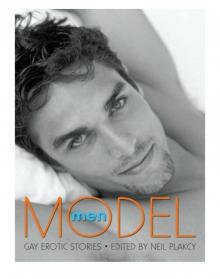 Model Men
Model Men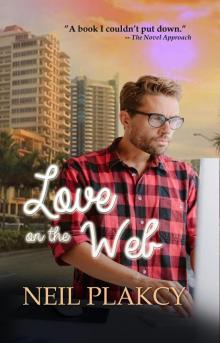 Love on the Web
Love on the Web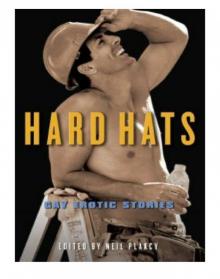 Hard Hats
Hard Hats Honest to Dog
Honest to Dog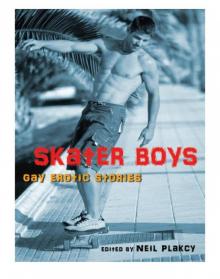 Skater Boys
Skater Boys Beach Bums_Gay Erotic Fiction
Beach Bums_Gay Erotic Fiction Love on Stage
Love on Stage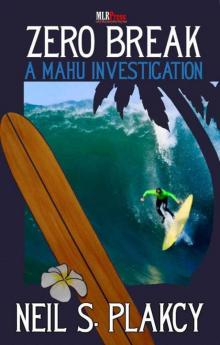 Zero Break
Zero Break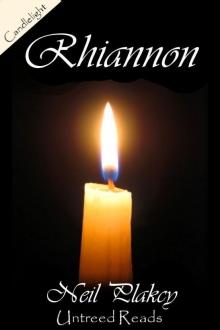 Rhiannon
Rhiannon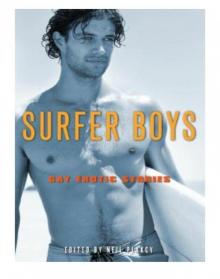 Surfer Boys
Surfer Boys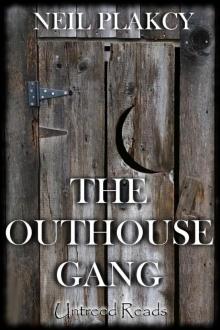 The Outhouse Gang
The Outhouse Gang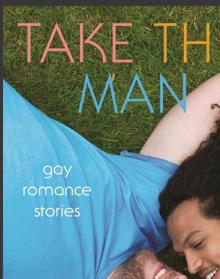 Take This Man
Take This Man Take This Man_Gay Romance Stories
Take This Man_Gay Romance Stories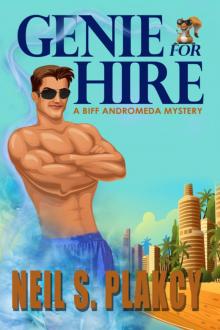 Genie for Hire
Genie for Hire